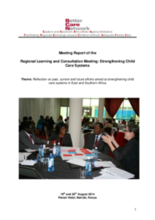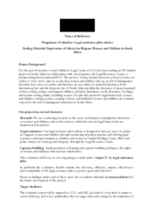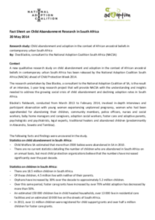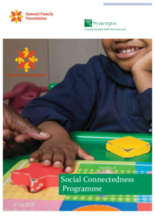childrens_living_arrangement
children_living_without_bio
Displaying 271 - 280 of 336
Following a consultative mapping, a regional learning meeting took place on 19-20 August 2014 in Nairobi, Kenya. The theme of this meeting was "Reflection on past, current and future efforts aimed at strengthening child care systems in East and Southern Africa."
Coram Children’s Legal Centre is looking for a consultant to conduct a Programme Evaluation of the Legal Assistance Pilot Scheme, which forms part of our EU funded project in South Africa, ‘Ending unlawful deprivation of liberty of women and children in South Africa’.
This fact sheet summarizes a qualitative research study conducted by the National Adoption Coalition South Africa (NACSA) that explored child abandonment and adoption in the context of African ancestral beliefs in urban South Africa. The goal of this one-year study was to better understand the growing practice of child abandonment and declining adoption rates in South Africa.
Comment les réseaux sociaux solides soutiennent les enfants d’Afrique subsaharienne et leurs familles. Les enfants et les familles vulnérables ont besoin d’un système de soutien social qui réponde aux problèmes qu’ils rencontrent grâce à des solutions efficaces et durables. Les observations présentées dans ce rapport sont un « cliché instantané » des pratiques prometteuses en matière de développement et de pérennité de la communauté.
The Human Dignity Foundation (HDF) invites organisations to respond to a Call for Proposals on child protection. The purpose of the call is to identify projects that will contribute to ensuring that ‘all children are safer at home and in the community’.
The Human Dignity Foundation (HDF) invites organisations to respond to a Call for Proposals on child protection. The purpose of the call is to identify projects that will contribute to ensuring that ‘all children are safer at home and in the community’.
This dissertation explores the experiences and representations of child abandonment in urban Johannesburg, South Africa.
This systematic review assessed the quantitative literature to determine whether orphans are more likely to experience physical and/or sexual abuse compared to non-orphans in sub-Saharan Africa (SSA). It also evaluated the quality of evidence and identified research gaps.
This book focuses on, and reviews, a selection of laws related to the rights of children in South Africa.
This report describes the Social Connectedness Programme and the three strands of research that inform it. The report defines social connectedness and social isolation and explains the benefits of social connectedness.







